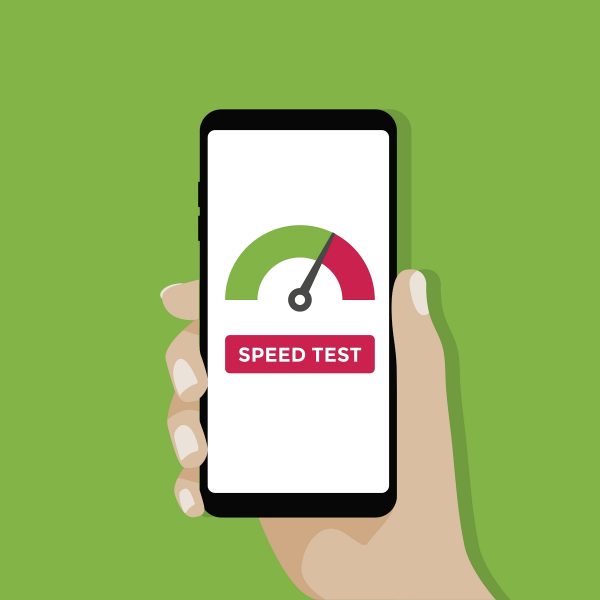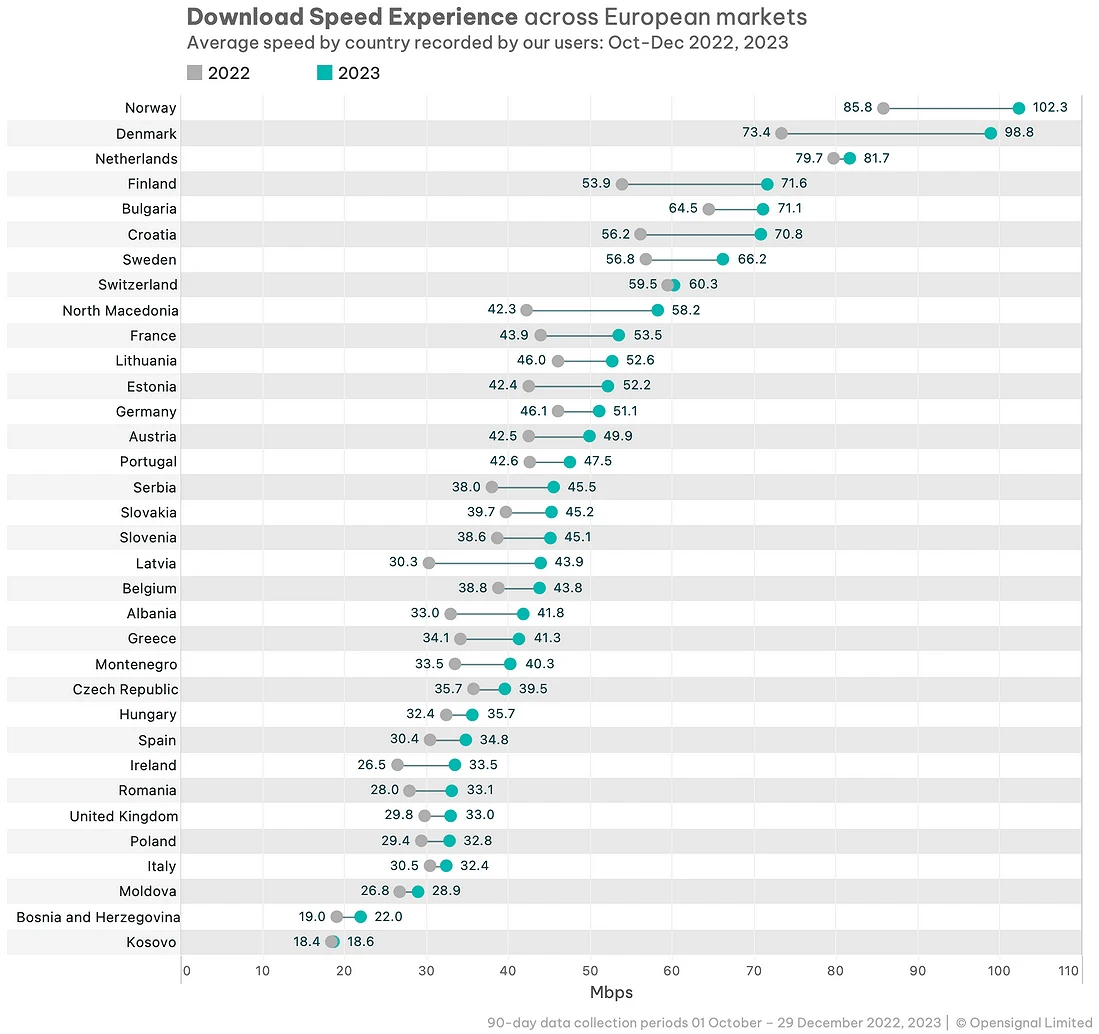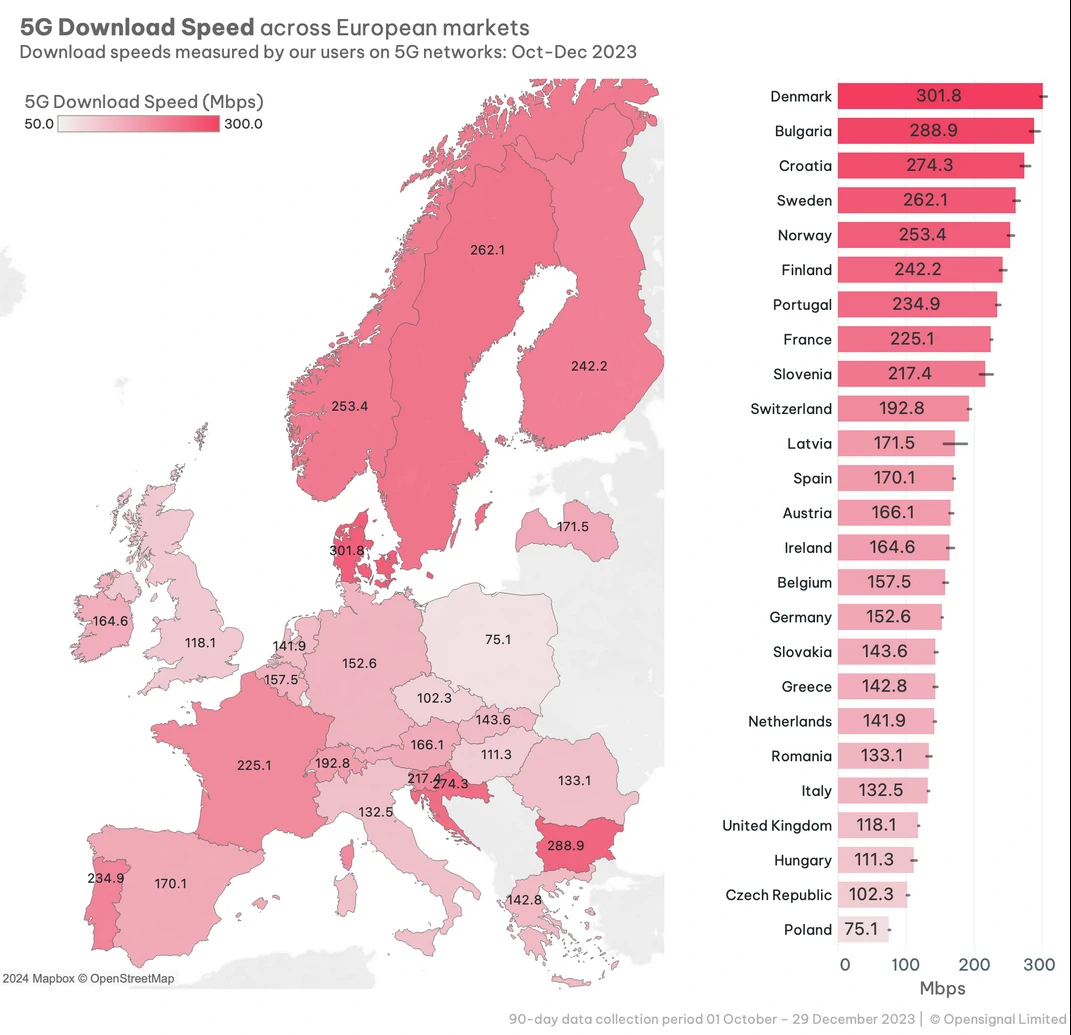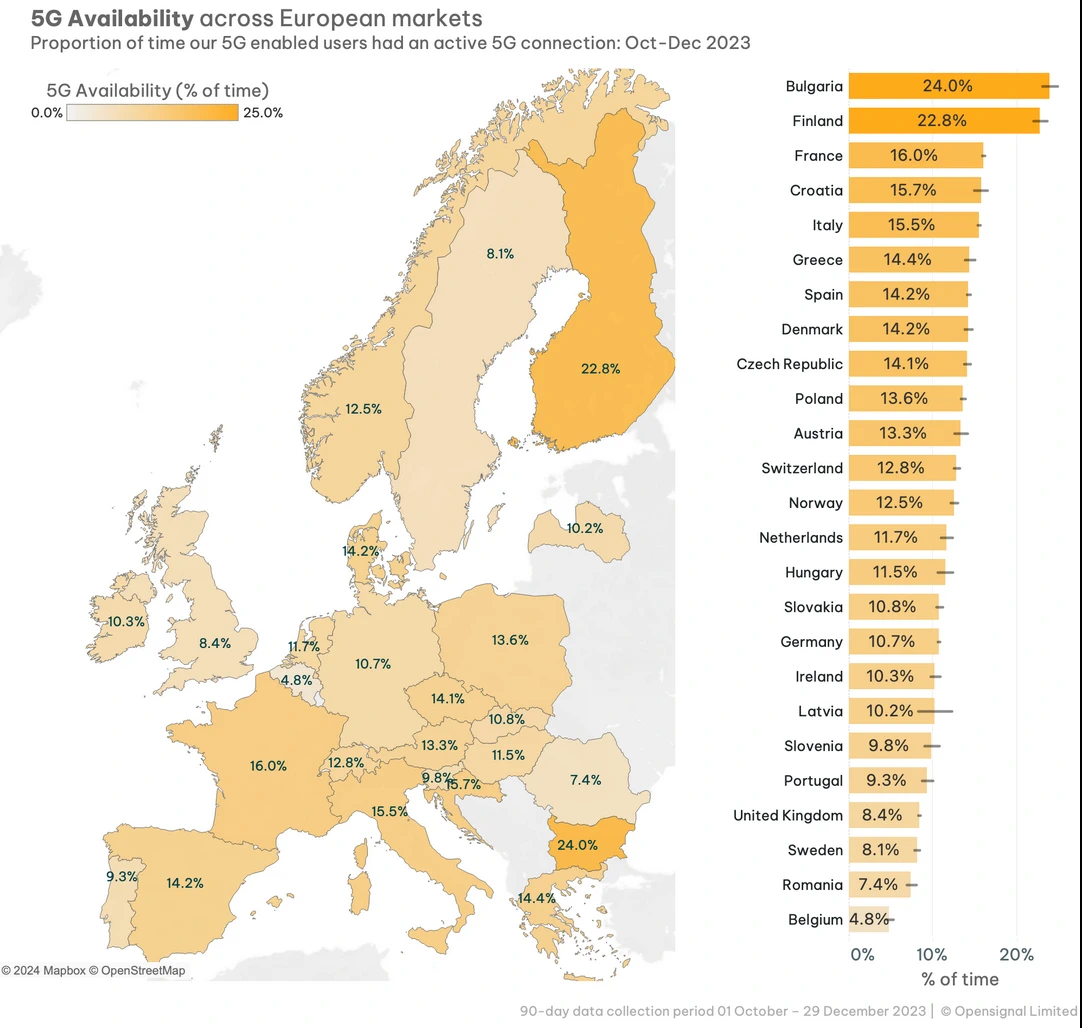UK Struggles in 2024 Country Ranking of Mobile Broadband Speeds

Crowdsourced benchmarking firm Opensignal, which collects data from consumer speedtests, has today published a new summary of mobile broadband (4G and 5G) speeds across Europe – based on data from Q4 2023. But if you want to find the UK, you’ll need to look toward the bottom of the tables.
In terms of the UK, the data reveals that our average (median) mobile download speeds (3G, 4G and 5G etc.) have increased from 29.8Mbps a year ago to 33Mbps today (+3.2Mbps). But this is actually one of the smallest increases across the continent. For example, Denmark’s speeds increased by +25.5Mbps in the year to reach 98.8Mbps.

Advertisement
The situation when looking at 5G specific speeds is similarly dire for the UK, placing us toward the bottom of the table, again. The UK delivered average 5G download speeds of 118.1Mbps, which actually doesn’t sound that bad, until you realise that it’s well below the vast majority of European countries. Front-runners Denmark and Bulgaria are, by comparison, delivering 301.8Mbps and 288.9Mbps, respectively.

On the subject of 5G network availability (i.e. the proportion of time 5G enabled users had an active 5G connection), the UK returned another poor showing on just 8.4%, which yet again places us near the very bottom of the table. By comparison, Bulgaria reached 24% and Finland hit 22.8%.

Advertisement
Country-to-country comparisons are notoriously difficult things to get right, but the above results are particularly poor for a country that was once one of the front-runners in the world for early 5G deployments and performance (mostly between 2019 – 2020). Network operators often point to the negative impacts of the COVID-19 pandemic and supply shortages, but those hit other countries too.
The reality is that the UK’s current situation is probably a combination of issues, such as the Government’s sudden U-turn to ban Huawei – this hit about a year after some operators (e.g. EE) had already started deploying 5G. Mobile operators previously warned that the decision, which also impacted existing 4G kit due to the close interdependency of such networks, could delay the completion of the 5G rollout by 2-3 years and add costs of up to £2bn across all operators (the hit to BT alone was c. £500m).
In addition, Ofcom hasn’t released as much 5G friendly spectrum as other countries, and in fact they’ve yet to release any of the higher frequently mmW bands (although 26GHz and 40GHz are due to be auctioned off soon) – these are very good at pushing multi-gigabit mobile broadband speeds in dense / busy areas.
On top of that, the UK Government has, until recently, been fairly lacklustre when it comes to setting ambitious targets for 5G. Back in 2017 they talked about getting “the majority of the population covered by a 5G signal by 2027,” which was a very low bar and commercial operators were always bound to reach 50%+ coverage well before 2027 (most hit this between 2022 and 2023). More recently, they’ve upped their game a bit and pledged for “all populated areas to be covered by ‘standalone’ 5G (5G-plus) by 2030” (here), but a solid target for geographic coverage is also needed.
Advertisement
The Government have similarly taken far too long to support the roll-out of 5G by cutting red tape on infrastructure build, which is at the time of writing is still going through Ofcom’s final consultation phase (here). In an ideal world, these measures would have been legislated for before the 5G deployment began in 2019. We can only hope that there’s a bit more ambition when it comes to the future deployment of 6G.
Finally, it’s worth remarking that recent mergers and proposed mergers between major network operators, such as Vodafone and Three UK, can sometimes cause delays to deployments because of the need to rationalise network coverage (e.g. remove unnecessary duplication) and re-plan future work.
Mark is a professional technology writer, IT consultant and computer engineer from Dorset (England), he also founded ISPreview in 1999 and enjoys analysing the latest telecoms and broadband developments. Find me on X (Twitter), Mastodon, Facebook, BlueSky, Threads.net and Linkedin.
« Ofcom and UK Phone Providers to Further Tackle Spoofed Calls UPDATE
Gigabit Broadband Still Top Digital Priority for UK Councils »





















































It’d be interesting to see those speeds cross-referenced against cost. As usual, the price-obsessed public get what they pay for!
Yet again this highlights the one thing that the UK is most proficient and top of the pile : being totally rubbish at anything technology based,
I think it’s more a way that the UK is treated in business.
Not just technology but everything is becoming a race to the bottom these days.
What is the minimum attainable metric for the lowest possible price and maximum return for shareholders.
It’s interesting with Vodafone in Fife Levenmouth area gets under 3 Mbps shocking for the money for you get over 100 Mbps or 1Gbps
Poor country (UK) has poor 5g connectivity. Have you seen the rest of our infrastructure (!?)
They rollout old tech selling it for new, of course it’s bad.
We have fake 5G, fake fiber there is no one thing that is what is supposed to be.
I’m seeing a lot of unused 5G towers, I’m talking over 12+ months just stood there. Why??
“I’m seeing a lot of unused 5G towers, I’m talking over 12+ months just stood there. Why??”
Because they’re not 5G towers.
I get somewhere between 0.1 and 5 Mbps on 4G and I live in a city. Dreadful, utterly dreadful.
Welcome to Great Britain.
What a time to be alive.
“What a time to be alive.”
Don’t worry, the Conservitives complete failure to invest in the NHS will solve that.
I imagine O2 are pulling the UK average numbers down a fair bit.
Normally I can get 4G, indoors, but not today on 2-3 signal bars and 5G isn’t registering at all (Normally, if the wind’s blowing in the right direction I can get 5G outdoors).
And that’s suburban North-West London on Three.
Nearly all the repeaters for 5G are on the ridgeline of Harrow-on-the-Hill making my location at the immediate bottom of the hill an “Over-flown” “Not Spot”. But all the little darlings attending Harrow School (In the immediate vicinity of the top of the Hill) can probably get a 10/10 signal using a single copper winding round their straw boaters and a cat’s whisker.
Why the fluffing hell the comms industry couldn’t have specified a 5 G repeater lite that could be affixed to telegraph poles/lamp standards to give a lower power local cell signal . . . ? It would have solved the “On demand” FTTP issue for broadband providers too !
Obviously, far too easy . . . not enough “Look-back-in-hunger” 14th century angst for the consumer
Because a “repeater” by definition halves the throughput of the original site.
I suspect one contributor to the UKs mobile speed issues are due to our lack of investment in fibre, meaning many 4G and potentially 5G sites have sub-optimal backhaul.
Zong jazz 5g
I split my time between Sofia, Bulgaria and London, UK and I can tell you that the difference in 4G speeds is enormous. I still have a 4G-only device and I typically get 10-15 mbps down in London on a good day, and I’ve tried all networks. Three’s 4G network is the worst at least in London, 1 mbps is not uncommon. Meanwhile in Sofia I regularly get 100+ mbps down on 4G.
Why are mobile speeds so good in Bulgaria when unlike Norway and Finland it doesn’t seem the obvious place for it.
Do they have a tough regulator who forces the mobile operators to build decent networks unlike the UK’s totally corrupt and in bed with the telecoms industry Ofcom?